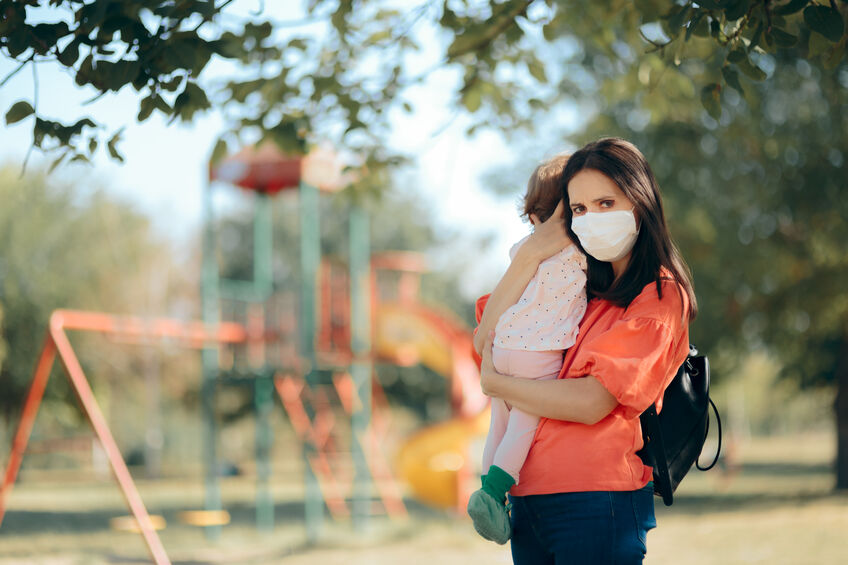
When it comes to our children’s emotional and social well-being, there are ways to ensure the autumn of our uncertainty doesn’t become another winter of our discontent
Most schools are planning for in-person classrooms this fall, though debates continue across the country over vaccine and masking requirements for protection from the Delta variant. We are all hoping for a return that is as close to normal as possible. But what exactly does “back to normal” mean, when we haven’t been functioning normally for 18 months? And what does it mean for children who’ve never known “normal?”
We as adults know that living amid a pandemic is difficult and stressful, and the conditions under which kids are living and learning are not ideal. We did what we could last year, patched it together. We explained rules and requirements, and all we’ve been anticipating—the vaccines, the de-masking, the normalcy.
Well, things aren’t looking as normal this fall as we thought they would. And the updates seem to change by the day. Which as adults can have us pulling our hair out….and in turn sends kids the message they should be, too. Uncertainty can be debilitating, because it hits all the prickly places. Impatience and fear amidst lots of anxiety. Lack of access to information, which causes inability to plan ahead. Helplessness, verging on a sense of hopelessness. We feel, essentially, like children facing a hurricane with our familiar anchors being blown away and left with no idea what the word really means.
I'd like to tell you a story a friend of mine once told me. She grew up in a large family that moved a lot for her father’s job, and while they were living in Illinois, would drive back to New England for Christmas. One year a blizzard struck mid-trip. The storm moved fast and the highway was soon completely obscured by blinding snow, and accumulating madly. Tractor trailers jack-knifed left and right. Her family’s station wagon carrying four kids under age 10 was blown around like a Hot Wheels toy. The back window shattered. They had to get off the highway, fast.
As she tells it, they approached the only visible motel, packed with people sleeping in the lobby. Her father tried to talk his way into taking any reservation not yet checked in, but no luck. Her parents said they might as well get something to eat, but of course the restaurant was packed. So they went to the lounge. My friend was 10 years old, and remembers her parents ordering drinks with silly names (Grasshopper!) and eating bar food while the lounge band covered “Proud Mary.” I’m sure her parents were terribly anxious. But to their kids, it had been made an adventure.
I’ve never met her parents, and she said they’re not whimsical people. But they modeled flexibility for their kids, the value of rolling with it rather than getting crushed by it. That sense of calm and flexibility in the face of upheaval helped them face any number of unknowns—whether it was a blizzard, a tornado, or starting a new school in a new town.
Yes, the pandemic is lasting far longer than an adrenaline-fueled winter road trip. But it strikes me that there are still valuable lessons here. We know children are emotional detectives, and take their cues from the key adults in their world. Parents (and teachers) can quiver and snap in uncertain situations, conveying emergency, terror. Or they can give a small shrug, remain calm and focused and say, Yes, it’s hard not knowing what the pandemic will be like next month, or the holidays. We only know what we know today, and the way we responded when things were challenging before.
But we can remind them of the many things we do know. By remaining calm amidst uncertainty we know our brains made good decisions yesterday, like when X Y Z happened. And we have every reason to think they will again, tomorrow.
In the end, showing our kids how to live with uncertainty might be one of the best lasting lessons of the pandemic.
These Posts on Parenting
Housman Institute, LLC
831 Beacon Street, Suite 407
Newton, MA 02459
info@housmaninstitute.org
(508)379-3012
Explore
Our Products
Legal
Connect
Contact
Join our Mailing List!
Subscribe to receive our newsletter, latest blogs, and ECSEL resources.
We respect and value your privacy.
No Comments Yet
Let us know what you think